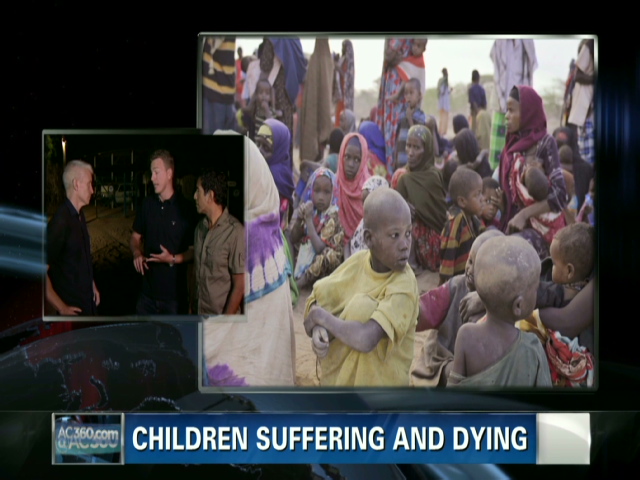 Dadaab, Kenya (CNN) -- Humphry Musyoka, a doctor at the world's largest refugee camp, knows well how quickly dehydration can ravage the body of a child.
Dadaab, Kenya (CNN) -- Humphry Musyoka, a doctor at the world's largest refugee camp, knows well how quickly dehydration can ravage the body of a child.
A young girl who seems OK one minute can turn on a dime. But Musyoka, who works at the Dadaab refugee complex in Kenya, says he has no time to think about loss.
"More are still coming, so we have to do something about that," he told CNN's Anderson Cooper."It's very challenging mentally, I'd say, because you lose life. But what do you do about the next one?"
"How are you going to respond?" he asks.
Such are the questions aid agencies are struggling to answer as fighting and famine push hundreds of thousands of Somalis to Dadaab, located near the border.
The United Nations has declared famine in five areas in southern Somalia, including the capital of Mogadishu.
The human catastrophe was triggered by the worst drought in more than half a century and compounded by decades of conflict, high inflation and increasing global food and fuel prices.
In all, about 12 million people in the Horn of Africa region need assistance; Somalia is the worst hit.
Originally built for less than 100,000 people, the Dadaab refugee complex now houses more than 400,000, while tens of thousands more cling to its edges.
Many of the children who arrive at the camp are severely malnourished, according to relief workers. Some have spent weeks on the road with their mothers, walking at night to avoid the heat, braving dust and dirt storms.
Extra beds have been added to the children's ward of a hospital, run by the International Rescue Committee.
A six-month old, suffering from diarrhea and vomiting, weighs six pounds. He should be twice that.
A listless, four-year-old girl is fed what looks to be fortified milk from a plastic mug; a hand props up her head. Still, they are the lucky ones, says CNN's Sanjay Gupta. About 29,000 children have died in the last month, according to U.N. estimates. And many who are sick will never recover.
One such girl was Sarah. Her father, Aden Ibrahim, buried her body beneath the desert floor some two weeks ago. She was four.
"She needed more help," Ibrahim said then. "We have not been given enough help because we have been given flour and maize only -- and a child who is sick will not get better on flour and maize."
The U.N.'s refugee agency is calling for more private and government donations for emergency operations in the Horn of Africa, warning that a lack of funds threatens future aid.
The aid organization says it needs $145 million to cover operations through the end of the year, adding that it has received 45% of that amount so far.
CNN correspondent David McKenzie recently revisited Ibrahim, who is now confined to his bed inside a makeshift tent.
"I haven't been able to do anything since I saw you last," said Ibrahim, weakened by fever and coughing fits. "All I can do is lie in bed with my son."



